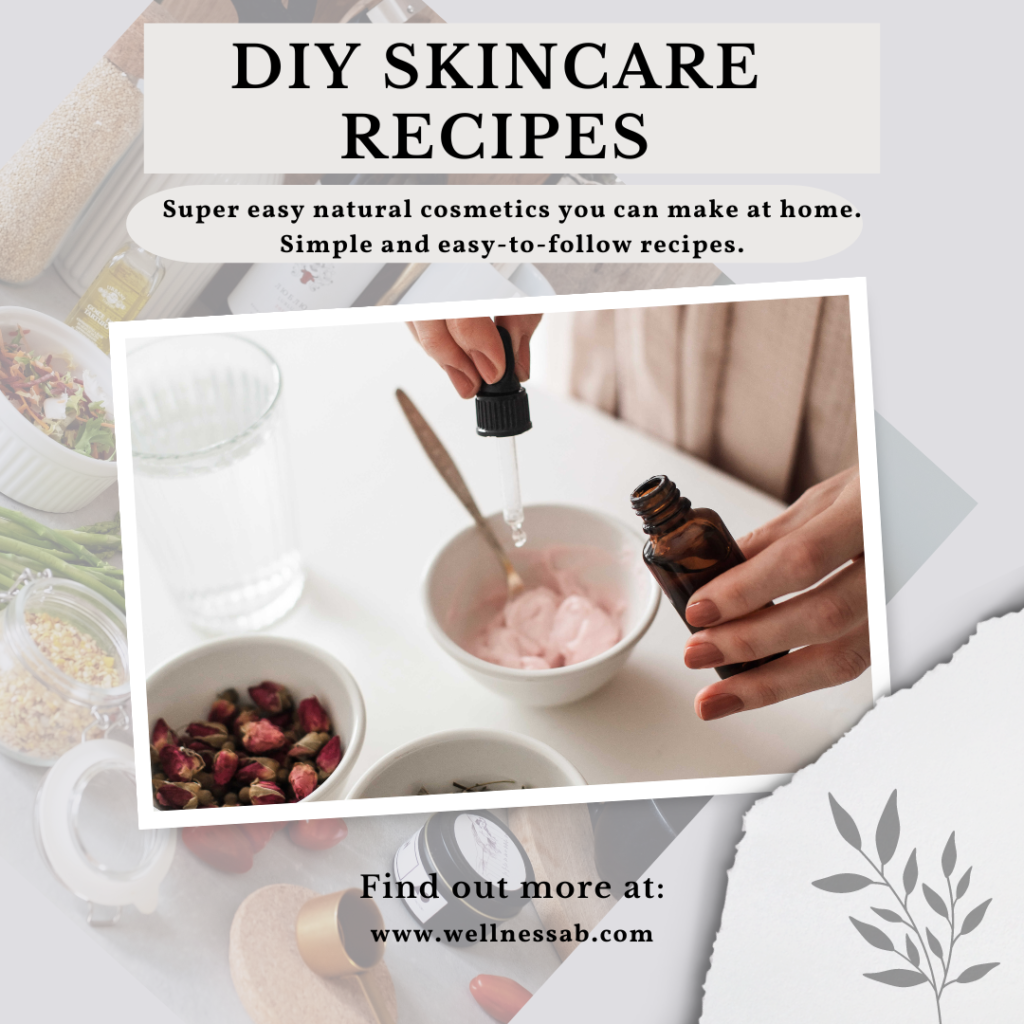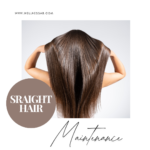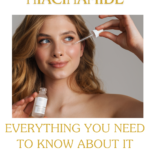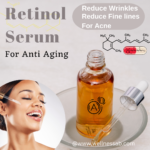
Table of Contents
Importance of Natural Skincare
In the realm of skincare, there’s a growing trend towards natural, DIY (Do-It-Yourself) solutions. This shift is driven by the increasing awareness of the potential harmful effects of synthetic ingredients found in many commercial skincare products. Natural skincare is not only gentle on the skin but also beneficial for overall health.
Benefits of DIY Skincare
DIY skincare recipes offer numerous benefits, including cost-effectiveness, customization, and the assurance of knowing exactly what ingredients are being applied to your skin. These recipes can be tailored to specific skin types and concerns, providing a more personalized approach to skincare.
Overview of the Article
This article will guide you through various DIY skincare recipes, from cleansers and toners to moisturizers, face masks, exfoliants, and serums. We will explore common ingredients, their benefits, and provide detailed recipes for each category. Additionally, we’ll discuss the benefits of DIY skincare and offer safety tips to ensure your homemade products are effective and safe.
Types and Categories of Skincare Recipes
Cleansers
Cleansers are the first step in any skincare routine, designed to remove dirt, oil, and impurities from the skin. DIY cleansers can be made with natural ingredients that cleanse without stripping the skin of its natural oils.
Toners
Toners help to balance the skin’s pH and prepare it for the next steps in your skincare routine. DIY toners often incorporate hydrating and soothing ingredients.
Moisturizers
Moisturizers are essential for hydrating the skin and maintaining its barrier function. DIY moisturizers can be customized to suit different skin types, providing essential nutrients and hydration.
Face Masks
Face masks provide an intensive treatment to address specific skin concerns. DIY masks can be made with various ingredients to target hydration, brightening, acne, and more.
Exfoliants
Exfoliants help to remove dead skin cells, promoting cell turnover and a brighter complexion. DIY exfoliants use natural ingredients to gently exfoliate without causing irritation.
Serums
Serums are concentrated formulations designed to deliver active ingredients deeply into the skin. DIY serums can be tailored to address issues like aging, dryness, and pigmentation.
Check This Out : "Radiant Skin : Ultimate Guide To Exfoliation"
Common Ingredients in DIY Skincare recipes
Carrier Oils
Carrier oils like jojoba, coconut, and sweet almond oil are used as the base for many DIY skincare recipes. They provide hydration and help to deliver other active ingredients into the skin.
Essential Oils
Essential oils like lavender, tea tree, and rosehip oil add therapeutic benefits to DIY skincare products, offering properties such as anti-inflammatory, antibacterial, and antioxidant effects.
Natural Butters
Shea butter, cocoa butter, and mango butter are commonly used in DIY moisturizers and balms for their nourishing and emollient properties.
Herbal Extracts
Herbal extracts like chamomile, calendula, and green tea provide soothing and antioxidant benefits, making them ideal for calming and rejuvenating the skin.
Clays and Powders
Clays like bentonite, kaolin, and French green clay are used in DIY masks and exfoliants to detoxify and purify the skin. Powders such as oatmeal and rice flour provide gentle exfoliation.
Fresh Ingredients
Fresh ingredients like cucumber, avocado, and aloe vera gel are packed with vitamins and antioxidants, making them great additions to DIY skincare recipes.
DIY Cleansers
Honey and Lemon Cleanser
Ingredients:
- 2 tablespoons raw honey
- 1 tablespoon fresh lemon juice
Instructions:
- Mix the honey and lemon juice until well combined.
- Apply to the face in circular motions.
- Leave on for 5 minutes, then rinse with warm water.
Benefits: Honey has antibacterial properties and is a natural humectant, while lemon juice brightens the skin and helps to clear acne.
Aloe Vera and Coconut Oil Cleanser
Ingredients:
- 2 tablespoons aloe vera gel
- 1 tablespoon coconut oil
Instructions:
- Blend aloe vera gel and coconut oil until smooth.
- Massage onto the face for 2 minutes.
- Rinse off with lukewarm water.
Benefits: Aloe vera soothes and hydrates the skin, and coconut oil provides deep cleansing and moisturizing properties.
Oatmeal and Yogurt Cleanser
Ingredients:
- 1/4 cup ground oatmeal
- 2 tablespoons plain yogurt
Instructions:
- Mix the oatmeal and yogurt to form a paste.
- Gently massage onto the face.
- Rinse off with warm water after 5 minutes.
Benefits: Oatmeal exfoliates and soothes the skin, while yogurt contains lactic acid to gently exfoliate and brighten the complexion.
DIY Toners
Rose Water Toner
Ingredients:
- 1/2 cup rose water
- 1 tablespoon witch hazel
Instructions:
- Combine rose water and witch hazel.
- Transfer to a spray bottle.
- Spritz onto the face after cleansing.
Benefits: Rose water hydrates and refreshes the skin, and witch hazel helps to tighten pores and reduce inflammation.
Green Tea and Apple Cider Vinegar Toner
Ingredients:
- 1/2 cup brewed green tea (cooled)
- 1 tablespoon apple cider vinegar
Instructions:
- Mix green tea and apple cider vinegar.
- Apply to the face with a cotton pad.
Benefits: Green tea is rich in antioxidants, and apple cider vinegar helps to balance the skin’s pH and prevent breakouts.
Cucumber and Mint Toner
Ingredients:
- 1/2 cucumber, blended
- 1/4 cup fresh mint leaves
- 1/2 cup distilled water
Instructions:
- Blend cucumber and mint leaves with distilled water.
- Strain the mixture and pour into a spray bottle.
- Use as a refreshing toner.
Benefits: Cucumber soothes and hydrates the skin, while mint provides a cooling effect and helps to reduce redness.
DIY Moisturizers
Shea Butter and Vitamin E Moisturizer
Ingredients:
- 1/4 cup shea butter
- 1 teaspoon vitamin E oil
Instructions:
- Melt the shea butter in a double boiler.
- Remove from heat and stir in vitamin E oil.
- Allow to cool and whip until fluffy.
- Apply to the face as needed.
Benefits: Shea butter is deeply moisturizing and nourishing, and vitamin E oil provides antioxidant protection.
Aloe Vera and Jojoba Oil Moisturizer
Ingredients:
- 1/4 cup aloe vera gel
- 1 tablespoon jojoba oil
Instructions:
- Mix aloe vera gel and jojoba oil.
- Apply to the face after cleansing and toning.
Benefits: Aloe vera hydrates and soothes, while jojoba oil mimics the skin’s natural sebum, providing balanced hydration.
Avocado and Honey Moisturizer
Ingredients:
- 1/2 ripe avocado, mashed
- 1 tablespoon honey
Instructions:
- Mash avocado and mix with honey.
- Apply to the face and leave on for 10 minutes.
- Rinse off with warm water.
Benefits: Avocado is rich in healthy fats and vitamins, providing deep hydration, and honey helps to retain moisture and soothe the skin.
DIY Face Masks
Turmeric and Honey Mask
Ingredients:
- 1 teaspoon turmeric powder
- 1 tablespoon honey
Instructions:
- Mix turmeric powder and honey to form a paste.
- Apply to the face and leave on for 10-15 minutes.
- Rinse off with warm water.
Benefits: Turmeric has anti-inflammatory and brightening properties, and honey soothes and hydrates the skin.
Avocado and Oatmeal Mask
Ingredients:
- 1/2 ripe avocado, mashed
- 2 tablespoons oatmeal, cooked and cooled
Instructions:
- Combine mashed avocado and oatmeal.
- Apply to the face and leave on for 15 minutes.
- Rinse off with warm water.
Benefits: Avocado provides deep hydration, and oatmeal soothes and calms the skin, making it ideal for sensitive skin.
Charcoal and Bentonite Clay Mask
Ingredients:
- 1 tablespoon activated charcoal powder
- 1 tablespoon bentonite clay
- 2 tablespoons water
Instructions:
- Mix activated charcoal, bentonite clay, and water to form a paste.
- Apply to the face and leave on until dry.
- Rinse off with warm water.
Benefits: Charcoal detoxifies the skin by drawing out impurities, and bentonite clay absorbs excess oil and tightens pores.
DIY Exfoliants
Sugar and Olive Oil Scrub
Ingredients:
- 1/2 cup sugar
- 1/4 cup olive oil
Instructions:
- Mix sugar and olive oil.
- Gently massage onto damp skin in circular motions.
- Rinse off with warm water.
Benefits: Sugar exfoliates dead skin cells, and olive oil provides hydration and nourishment.
Coffee Grounds and Coconut Oil Scrub
Ingredients:
- 1/4 cup used coffee grounds
- 2 tablespoons coconut oil
Instructions:
- Combine coffee grounds and coconut oil.
- Gently scrub onto the skin in circular motions.
- Rinse off with warm water.
Benefits: Coffee grounds exfoliate and reduce puffiness, while coconut oil moisturizes and soothes the skin.
Baking Soda and Honey Scrub
Ingredients:
- 1 tablespoon baking soda
- 2 tablespoons honey
Instructions:
- Mix baking soda and honey to form a paste.
- Gently massage onto the skin.
- Rinse off with warm water.
Benefits: Baking soda provides gentle exfoliation, and honey soothes and hydrates the skin.
DIY Serums
Vitamin C Serum
Ingredients:
- 1 teaspoon vitamin C powder
- 1 tablespoon distilled water
- 1 teaspoon glycerin
Instructions:
- Dissolve vitamin C powder in distilled water.
- Add glycerin and mix well.
- Apply a few drops to the face daily.
Benefits: Vitamin C brightens the skin, reduces the appearance of dark spots, and promotes collagen production.
Hyaluronic Acid Serum
Ingredients:
- 1/4 teaspoon hyaluronic acid powder
- 2 tablespoons distilled water
Instructions:
- Dissolve hyaluronic acid powder in distilled water.
- Transfer to a dropper bottle.
- Apply a few drops to the face daily.
Benefits: Hyaluronic acid hydrates the skin by retaining moisture, leading to a plump and youthful complexion.
Rosehip Oil Serum
Ingredients:
- 1 tablespoon rosehip oil
- 2 drops lavender essential oil
Instructions:
- Mix rosehip oil and lavender essential oil.
- Apply a few drops to the face at night.
Benefits: Rosehip oil is rich in vitamins A and C, promoting skin regeneration and reducing the appearance of scars and fine lines.
Benefits of DIY Skincare
Cost-Effective
DIY skincare is often more affordable than store-bought products, as you can use ingredients you already have at home.
Customizable
You can tailor DIY skincare recipes to suit your skin type and specific needs, ensuring you get the best results.
Chemical-Free
By making your own skincare products, you can avoid harmful chemicals and synthetic ingredients, opting for natural alternatives instead.
Environmentally Friendly
DIY skincare reduces packaging waste and reliance on mass-produced products, contributing to a more sustainable lifestyle.
FAQs on DIY Skincare
How long do DIY skincare products last?
The shelf life of DIY skincare products varies depending on the ingredients used. Generally, products without preservatives should be used within 1-2 weeks and stored in the refrigerator.
Can DIY skincare products cause allergies?
Yes, DIY skincare products can cause allergies if you use ingredients that you are sensitive to. Always perform a patch test and be cautious with new ingredients.
Are DIY skincare products effective?
DIY skincare products can be very effective if made and used correctly. Using fresh, high-quality ingredients and proper formulations can yield excellent results.
Conclusion
Recap of the Benefits
DIY skincare offers numerous benefits, including cost savings, customization, and the use of natural ingredients that are gentle and effective.
Encouragement to Try DIY Skincare
Experimenting with DIY skincare recipes can be a fun and rewarding experience. It allows you to take control of what goes on your skin and tailor your skincare routine to your needs.
Final Thoughts
By embracing DIY skincare, you can create products that are not only beneficial for your skin but also environmentally friendly and free from harmful chemicals. Start your DIY skincare journey today and discover the benefits of natural, homemade skincare products.











